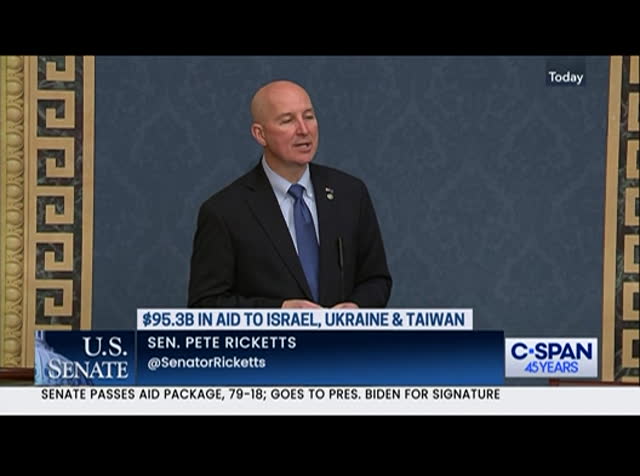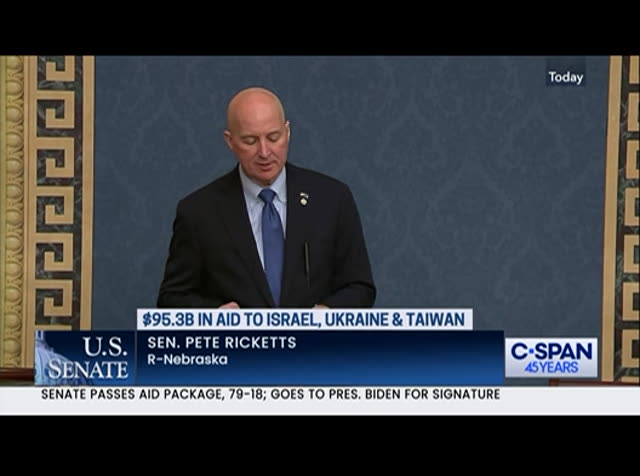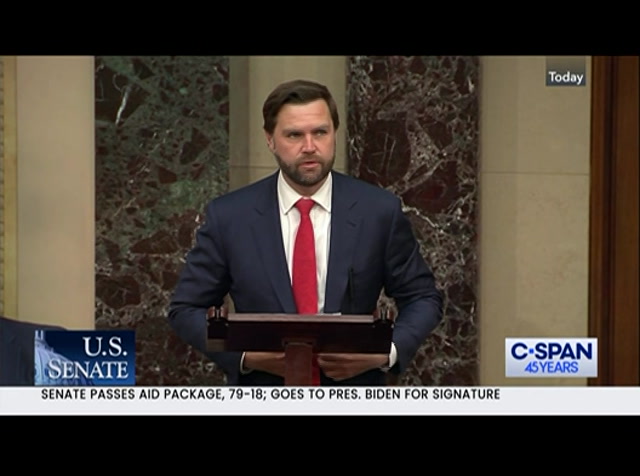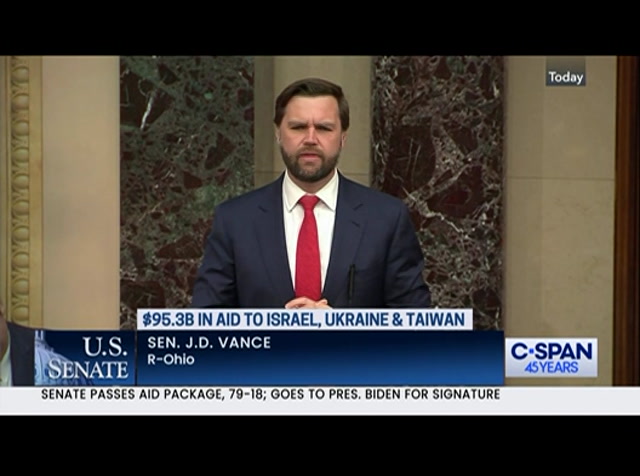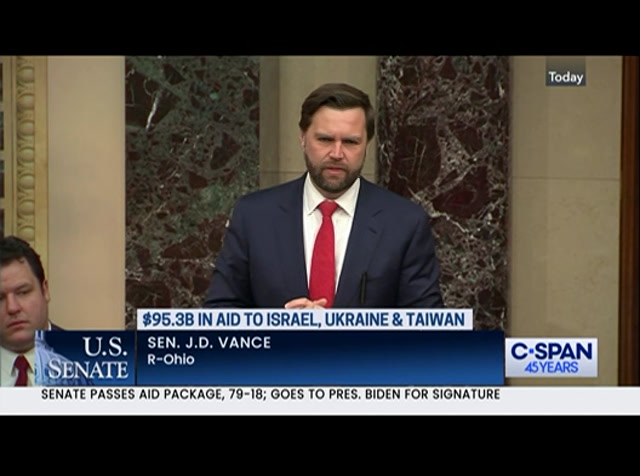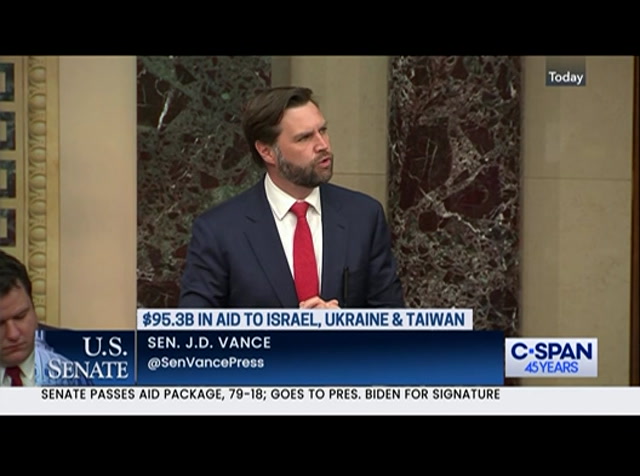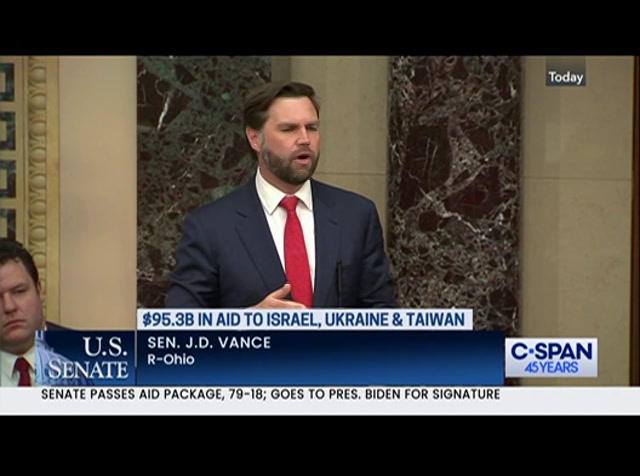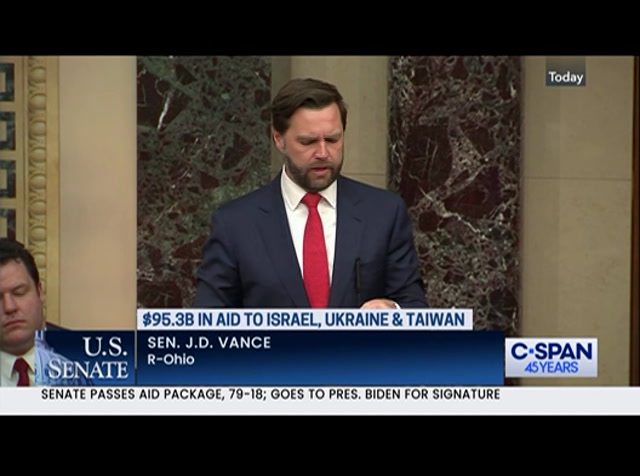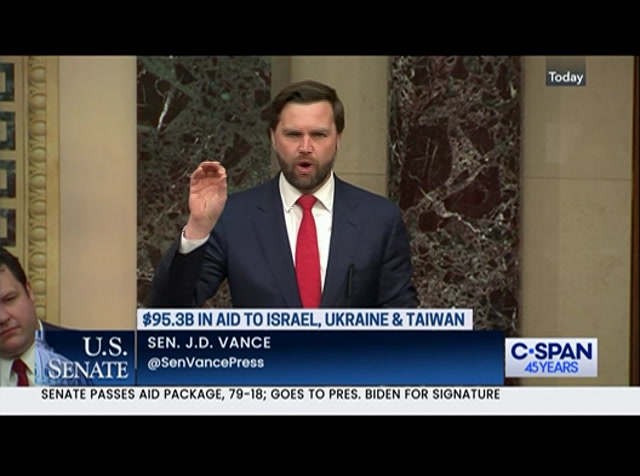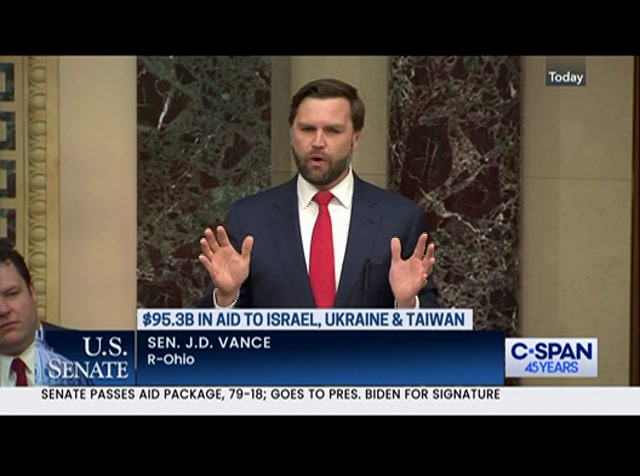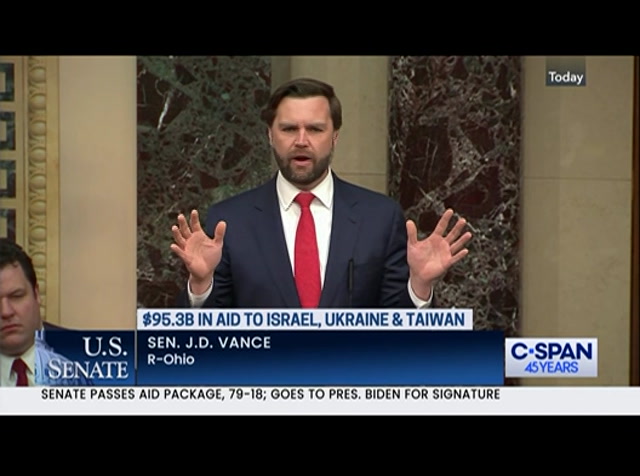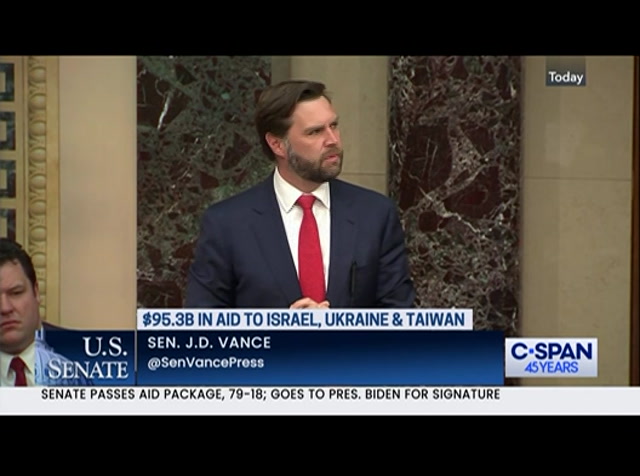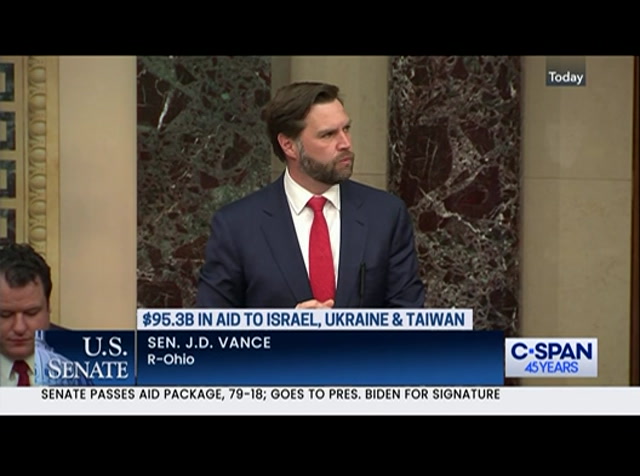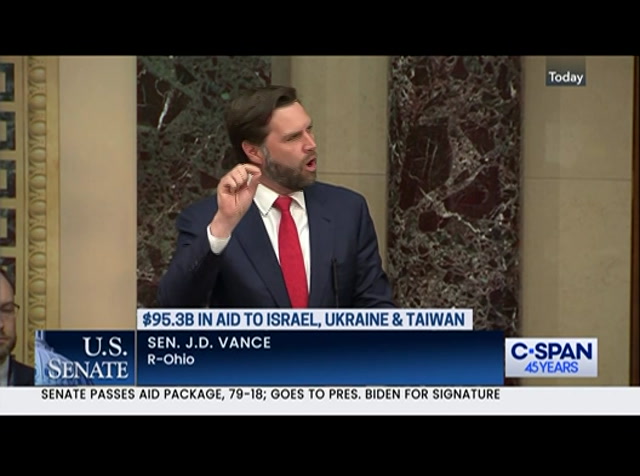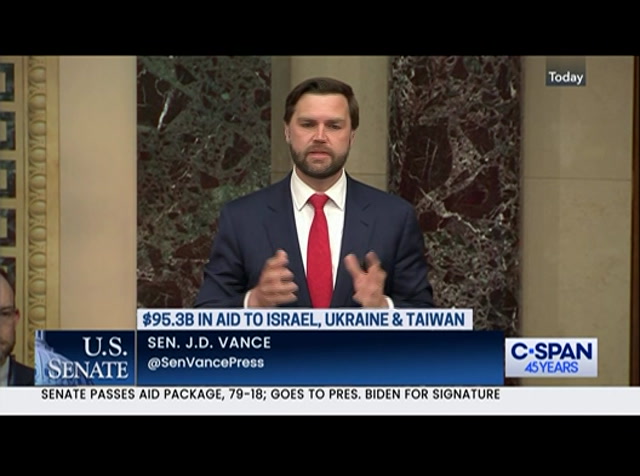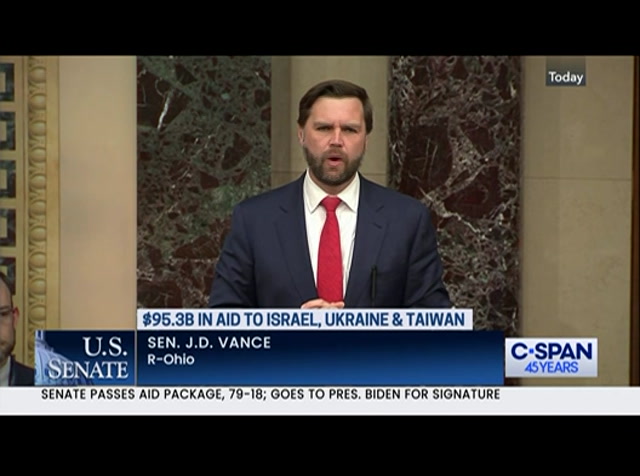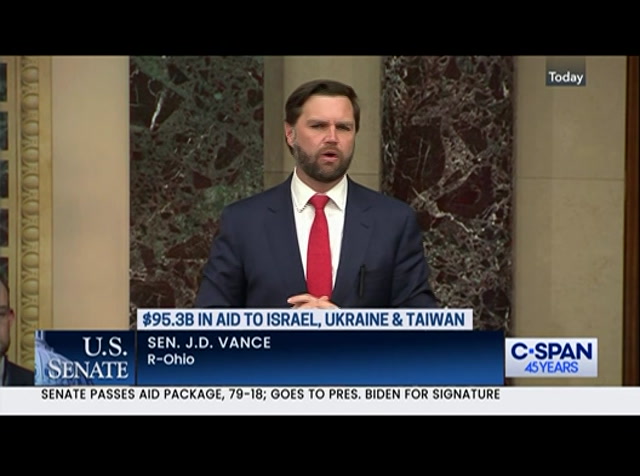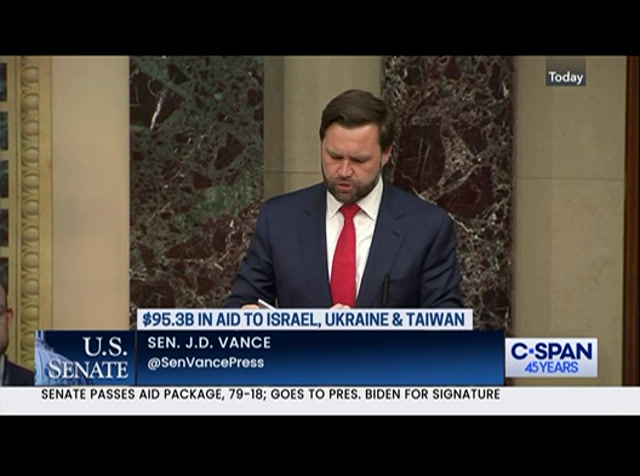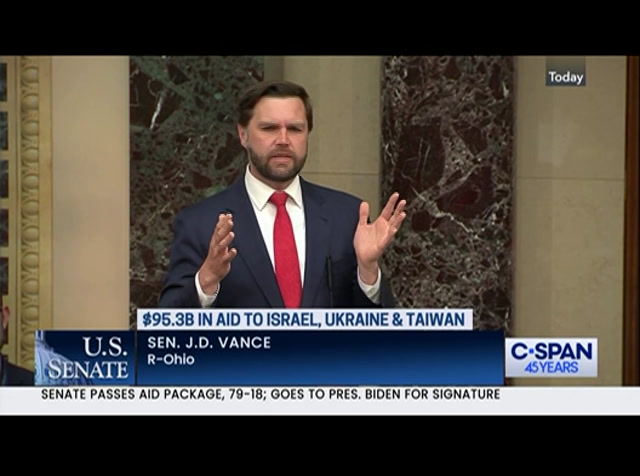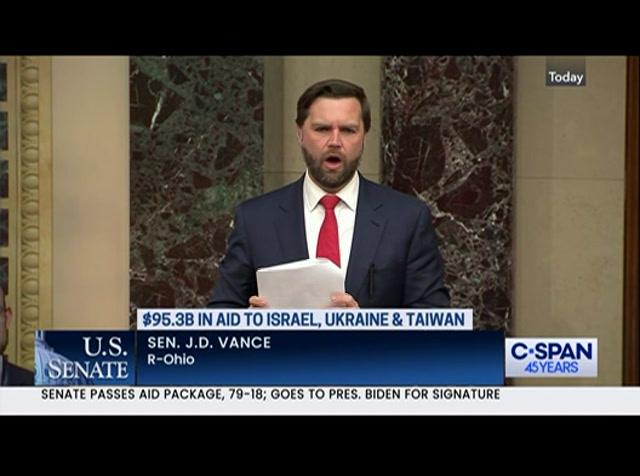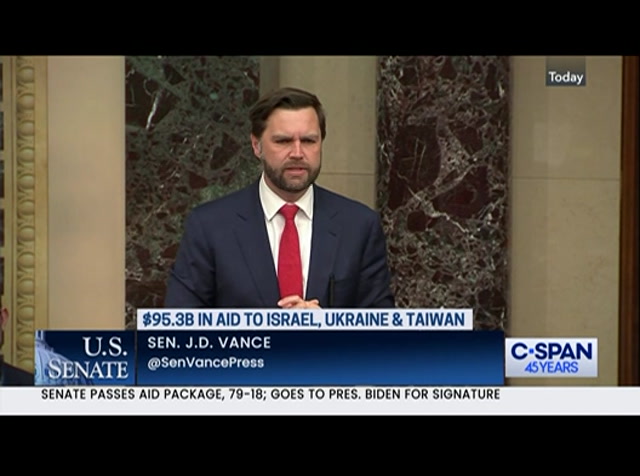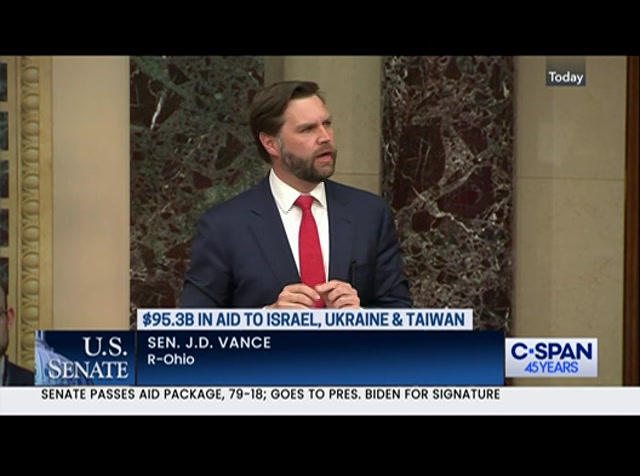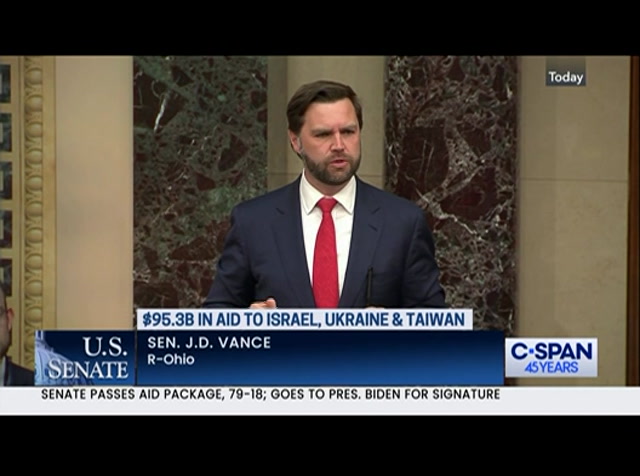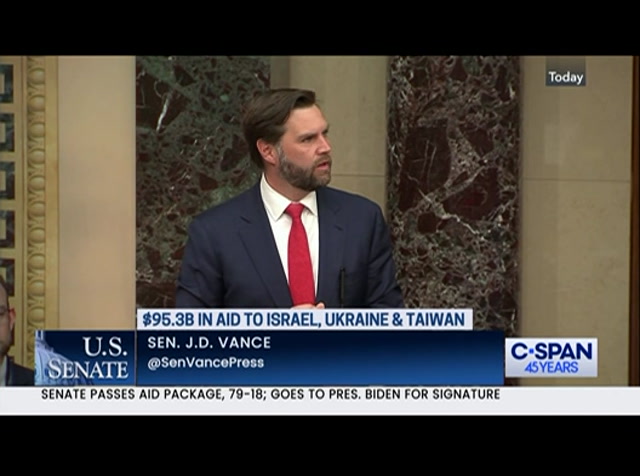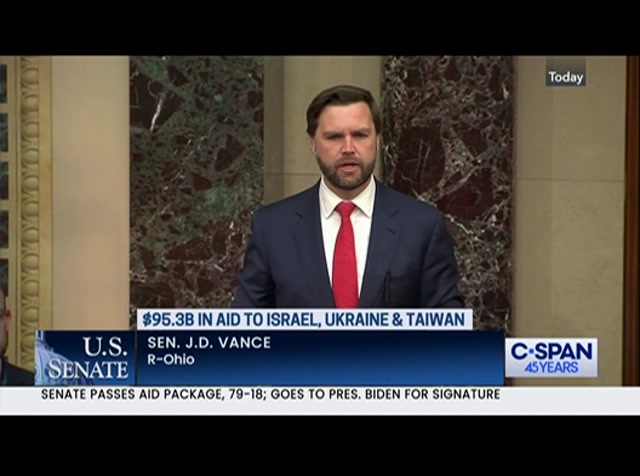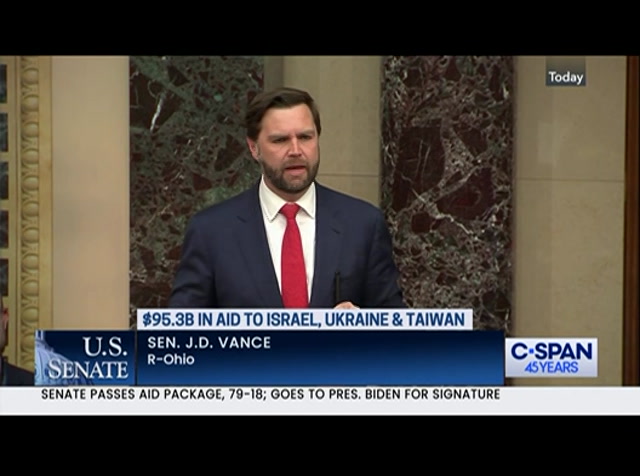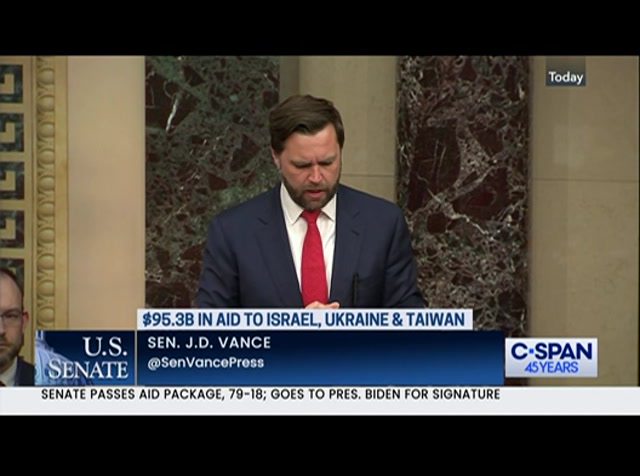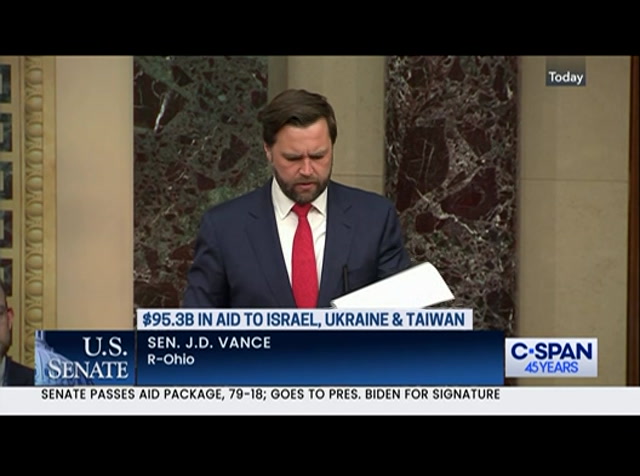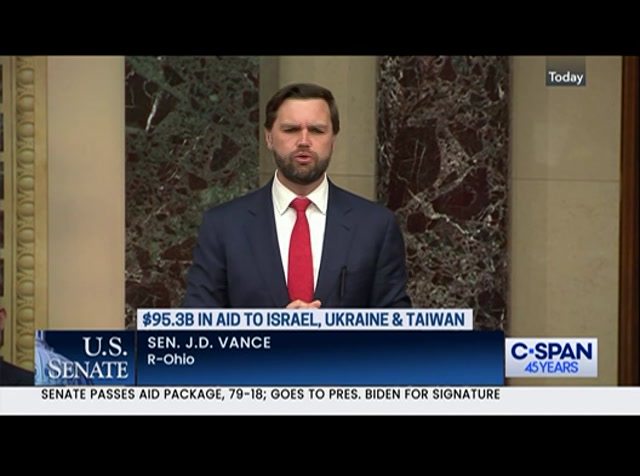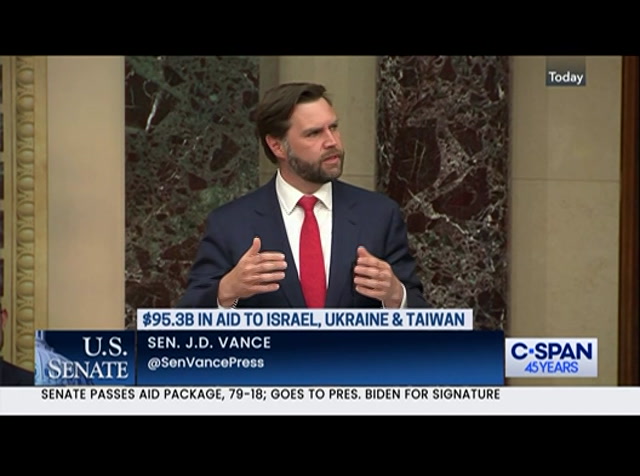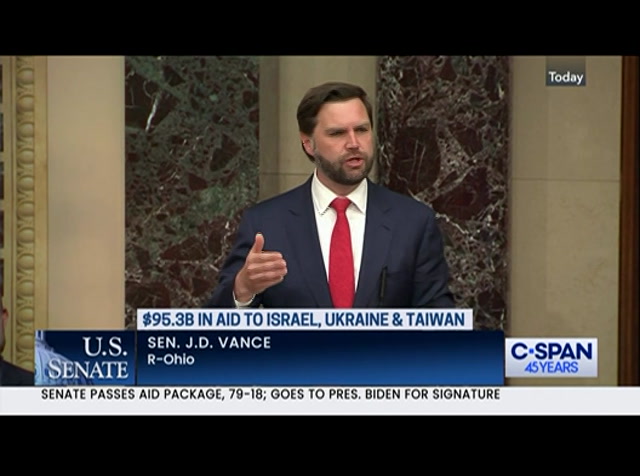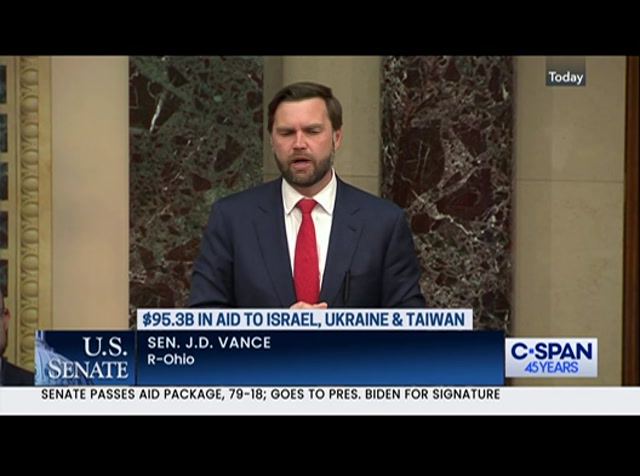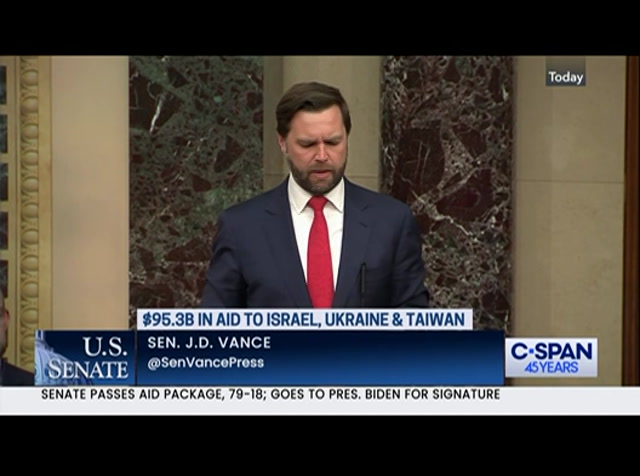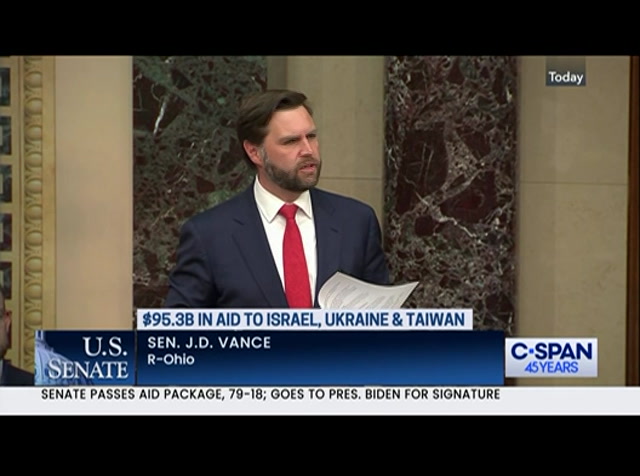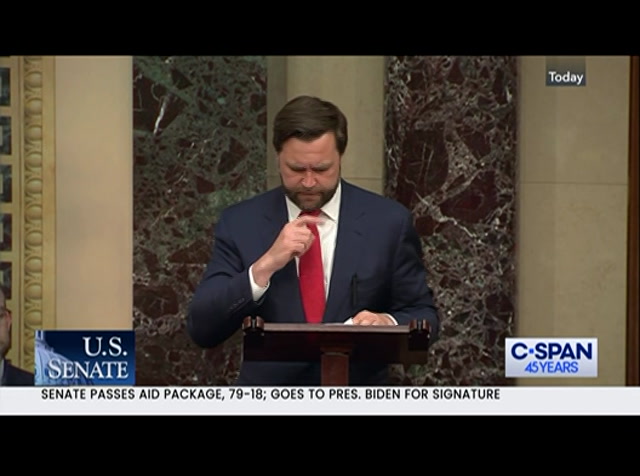tv U.S. Senate Sen. Vance Against Ukraine Aid Bill CSPAN April 23, 2024 10:41pm-11:16pm EDT
10:41 pm
adversary or foreign entity presents a national security threat and has over one million active users annually. it also protects individual use. no enforcement action can be taken against individual users of banned applications. civil enforcement actions may only be initiated against companies that violate the act. the bill incentivizes china to divest from tiktok or tiktok will face a ban. if divested from the ccp it will continue to operate in the u.s. if the restrictions are already in effect and tiktok has divested later, the restrictions will be lifted. i believe the chinese communist party is the greatest threat we face in this nation. they are fighting smart trying to undermine us from within and using technology like tiktok to do it. together by passing this bill, it is my hope that we will send a loud message, a clear message that america is not open to the
10:42 pm
chinese communist party p for influence. we are taking a stand to protect our own, protect our values, and then a major chinese communist party our hero. let's be that hero. thank you very much. i yield back. the presiding officer: the senator from ohio. mr. vance: thank you very much, mr. president. with respect to my colleagues who voted in the other direction on there piece of legislation, let me offer some serious concerns about the direction we're headed as a country and about what this vote represents in terms of american readiness, american capacity to defend itself and its yooels in the future -- allies in the future and most importantly, the american leadership's ability to acknowledge where we really are as a country, our strengths, our
10:43 pm
weaknesses, what can be built upon and what must be rebuilt entirely. i am extraordinarily aware of a couple of historical anothingies -- analogies that should inform this debate, one that seems to always inform the debate and another that never seems to come up. opponents of further aid in ukraine, and i count myself among them, say that this is a chamberlain v. churchill kind of moment. you heard my colleague from delaware make this analogy. and no disrespect, but we need to come up with another analogy, we need history with not world war ii replaying itself over and over again. vladimir putin is not adolf hitler. it doesn't mean he is a good guy, but he has less capability
10:44 pm
than the german leader did in the late 1930's. america is not america of the late 1930's or early 1940's. we possess substantially less manufacturing might in relative terms than we did almost 100 years ago. and most importantly, there are many ways in which in which the -- ways in which the analogy falls apart even if you ignore russia's and china's capacity and the like. there are other ways to look at it. i would like to point to a couple of those right now. the second world war, of course, was the most devastating war in the history of the world. first behind it is the first world war. what is the history lesson of the first world war? the lesson of world war i, is that if you're not careful, you
10:45 pm
could be in a brodeur regional conflict that kills tens of millions of people, many of them innocent. in 1914 the failure of statesmenship dragged two rival blocks of militaries into a catastrophic conflict. in the past week alone, the council on foreign relations published an essay calling for european troops. some european leaders said they might send troops to support ukraine in a conflict. perhaps the history lesson we should teach ourselves isn't chamberlain versus churchill. perhaps we should ask ourselves how an entire continent and how an entire world set of leaders allowed itself to blunder into world conflict? is there possibly a diplomatic solution to the conflict in ukraine? yes, i believe there is. indeed, as multiple people, as
10:46 pm
critics of putin and ukraine pointed out, there was a deal on the table 18 months ago. and what happened to it? the biden administration pushed zelenskyy to set aside the peace agreement and to engage in a disastrous koirnt offensive -- koirnt offensive, that defeated a decades worth of military stock and left us where we are now, where every observer of the war acknowledges that the war is worse for ukraine than it was 18 months ago. could we have avoided it, yes, we could and we should have avoided it. we would have saved a lot of lives and american weapons and we would have had this country in a better and more stable place if we had. there's another historical analogy worth pointing out and that is of the early 2000's.
10:47 pm
now in 2003, i was a high school senior and i had a political position back then. i believed the propaganda of the george w. bush administration that we needed to invade iraq, that it was a war for freedom and democracy, these who were appeasing saddam hussein were inviting a broader regional conflict. does that sound familiar to anything we're hearing today? it's the same exact talking points 20 years later with different names. but ahave we learned anything? no, i don't think we have. we have learned if we baet our chest -- beat our chests instead of diplomacy, it will produce a good outcome. we learned that if we traumatic about world war ii, with we can bully people and lead the country straight into catastrophic conflict. now, it's one of the great ironies of my time in the united states senate for the last 18
10:48 pm
months, i have been accused by multiple people of being a stooge of vladimir putin. i take jesh with that. in -- issue with that. in 2003, i are supported the war, and later enlisted into the marine corps, one of the kids in my town to enlist in the marines that year. i served my country honorableably, and i saw when i went to iraq that i had been lied to. that the promises of the foreign policy establishment of this country were a complete joke. just a few days ago, we saw our friends in the house waving ukrainian flags on the floor of the united states house, which i would love to see them waving the american flags with such gusto and i won't complain about the fact that it was a violation of the rules of decorum, but it certainly was. but it reminded me and i believe in 2005, maybe 2006, when that
10:49 pm
same exact chamber, the members were raising their fingers stained with purple ink to commemorate the incredible iraqi elections that happened in 2005. i was in iraq in this 02005 and for the parliamentary elections in december of 2005. i remember people of iraq happily voting, raising their fingers in the air. the people of iraq were not bad or this were not bad for voting in their elections. what i am saying is the obsessive focus on moralism, democracy is good, saddam hussein is bad. america is good, tyranny bad. that is no way to run a foreign policy because then you end up with people waving their fingers on the floor of the united states house of representatives even though they have walked their country into a disaster. i is a -- i say this has a proud republican.
10:50 pm
it is perhaps the most shameful period in the republican party's history of the last 40 years that we supported george w. bush and the prosecution of that military conflict. my excuse is i was a high school senior. what is the excuse of many people that were in this chamber or in the house of representatives at the time that are now singing the exact same song when it comes to ukraine? have we learned nothing? have we updated nothing about our mental thinking, about the standard that we apply for when we should get involved in military conflicts? have we learned nothing about how precarious and sprecious u.. life is and we should be more careful about protecting it. back then in 2003 we he had an antiwar left in this country. now nobody is worried about prosecuting military conflicts overseas. nobody seems to worry about unintended consequences.
10:51 pm
but iraq had a lot of unintended consequences, a lot of consequences that were maybe foreseen by a few smart people, a lot of them that weren't foreseen by anybody, one of which is that we gave iran a regional ally instead of a regional competitor. the george w. bush -- did george w. bush stand before the american people appeared say we're going to give one of our strongest enemies in the world a massive ally? did we think that iraq would become a base to attack american troops in the middle east? did we think it would empower one of the most dangerous regimes? we're now funding israel, as i think that we should, to defend itself against attacks that are originating in iran when the same people who are calling for more war all over the world were the same people who caused us to start a war that empowered iran. there's a certain irony in this, a certain sadness that i have that we never seem to learn the lessons of the past.
10:52 pm
we never seem to ask ourselves why is it that we keep on screwing up american foreign policy, why is it that we keep on making our country weaker, even though we say that we intend to make it stronger. here's another thing that we should learn from the iraq war. something that i as a christian care a lot about and think think that -- and i think that many of my colleagues, who are not christians many of my fellow americans should care about. the united states remains to this day the largest christian nation, we are the largest christian nation by population in the entire world. and yet what are the fruits -- by your fruits ye shall know them, the bible tells us. what are the fruits of american foreign policy when it comes to christian populations all over the world over the last few decades? this iraq before we invaded there were 1.5 million christians in iraq, many of them ancient communities, people who traced their lineage and
10:53 pm
ancestors to people who knew the literal apostles of jesus christ. now nearly every single one of those historic christian communities is gone. that is the fruits of american labor in iraq. a regional ally of iran and the eradication and decimation of one of the oldest christian communities in the world. is that what we were told was going to happen? did the american people, the largest christian nation in the world, did they think that's what they were getting themselves into? i certainly didn't. we did. we did all of those things because we weren't thinking about how war and conflict lead to unexpected places. now, that sounds is far-fetched i'm sure when we apply these lessons to the ukraine conflict certainly. certainly this has that noific are -- this has no risk of spilling over into a broader world conflict. certainly not in fact. i was being sar c -- sarcastic.
10:54 pm
yes, the ukraine war threatenses to become a broader regional conflict. what about the assault on traditional christian communities? just today the ukrainian parliament is considering enacting a law that would dispossess large numbers of christian churches and christian communities in the country of ukraine. now, they say it's because these churches are too close to russia. that's what they sociality and maybe some of the churches are too close to russia. but you don't deprive an entire religious community of their religious freedom because some of its adherents don't agree with you about the relevant conflict of the day. i believe standing here that this war will eventually lead to the displacement of a massive christian community in ukraine and that will be our shame, our shame in this chamber for not
10:55 pm
seeing it coming, our shame for not doing nothing to stop it, our shame for refusing to use the hundreds of billions of dollars that we sent to ukraine as leverage to ensure and guarantee real religious freedom. the other thing -- one final point on this historic contingency point. it was true then and it was true today, there's this weird way or the debate in this country has gotten warped, where people can't engage in good-faith disagreement with our ukraine policy. you will immediately be attacked for being on the wrong team, for being on the wrong side. i remember as a young conservative high schooler how opponents from the conservative side of the iraq war, well, you're just all for saddam hussein. and you believe in -- you believe that saddam hussein should be allowed to continue to brutalize the iraqi people.
10:56 pm
you have no love for these innocent iraqi people. you don't believe in america. and the same exact arguments are being applied today, that you are a fan of vladimir putin if you don't like our ukraine policy. you're a fan of some terrible tyrannical idea because you think maybe america should be more focused on the border of its own country than on someone else's. this war fever, this interability for -- this inability for us to actually process what's going on in our world to make rational decisions is the scariest part of this entire debate. you see people who served their country who have been advocating for good public policies -- agree or disagree with them -- for their entire careers smeared as agents of a foreign government simply because they don't like what we're doing in ukraine. that's not good-faith debate. that is slander, and it's the
10:57 pm
type of slander that's going to lead us to make worse and worse decisions. it should make us all feel pretty weird when you see your fellow americans making an argument and the response to that argument is not, well, no, no, no, here's why you're wrong, or here's why i disagree with you. but they fling their finger in their face and say you're a putin puppet. you're an asset of a foreign regime. this way of making decisions democratically is how we bankrupt this country and start a third world war. we should stop doing t so let me make some arguments for why our ukraine policy doesn't make any sense. the first -- we do not have the manufacturing base to support a land war in europe. this must be appreciated, and it's interesting, mr. president -- when i was making this argument that we didn't have the manufacturing base to support a
10:58 pm
military conflict in eastern europe, to support a military conflict in east asia and that also to actually support our own national defense, that america was spread too thin, i was commonly met 18 months ago with a very common rejoinder. i was told that the ukraine war represented a fraction of a fraction of american gdp, that we could do everything all at once and it would not stress america's capabilities. now everyone seems to agree with me. now everyone seems to acknowledge that we are severely limited not in the number of dollars that we can send to ukraine -- there are limits there -- but in the number of weapons, of artillery shells, of mills that we don't make enough of the weapons of with aer to send them to all four corners of the world and also keep ourselves safe. but people will say, well, jd is right. we need to rebuild the defense industrial base. we need to rebuild our capacity
10:59 pm
to manufacture weapons. but now the need to manufacture more weapons is an argument for the ukraine conflict instead of an argument against t it is interesting how advocates of this conflict always find a new justification when the justification of a few months ago falls apart. so let me deal -- let's deal with some cold, hard facts. the ukrainians have argumented publicly, their defense minister has said this, that they require thousands of air defense interceptor missiles every single year in order to keep themselves safe from russian attack. do we make thousands? no. if this supplemental passes, as i expect it will in a few hours, we will go from making about 550 interceptor missiles to about 650. there are a few other missile systems that can provide protection in terms of air defense, but ukraine's air
11:00 pm
defenses are being overwhelmed right now because we don't make enough air defenses. europe doesn't make enough airence defenses and by the way we're being stretched in multiple different directions. the israelis need them. the ukrainians need them to push back against russian attacks. we may, god forbid, need them. and the taiwanese will need them if they are ever invaded. we don't make enough weapons. so inrather -- so rather than stretching ourselves too thin, we should be focused on the task of diplomatsly and making it possible for our friends and allies do as much as they can but to recognize the limbations and to ensure that we most of all our own people in our own country can look after our own defense. it is not just. military shells, one of the most military weapons for the land war in europe.
11:01 pm
the united states makes a fraction of what the ukrainians need. if you combine what the united states needs with what the europeans -- or what the united states provides with what the europeans are able to provide and other figures are able to provide, we are massively limited in whether we can help ukraine close the gap that it currently has with russia. now, you've heard senior figures in our defense administration say that unless this bill passes, unless this bill passes, the ukrainians will face a 10-1 disadvantage when it comes to critical munitions like artillery. what gets less head is lines is that currently the ukrainians have a 5-1 disadvantage and there is no credible pathway to give them anything close to parity, and i am not even talking about this year. i am fog next year, too. during conversation with a senior national security official of the biden administration, i was told that if the united states radically
11:02 pm
ramps up production and if the europeans ramp up production, the ukrainians will have a 4-1 disadvantage by 2025. that was treated as good news. you cannot win a land war in europe with a 4-1 disadvantage in artillery. especially when the country you are going up against has four times the population that you do. and of course the most important resource in war, even in modern war, is not just air defense missiles and is not just artillery shells. the most important resource is human beings. human beings still fight our wars, as tragic as that is and as much as we wish it wasn't true. and ukraine has a terrible manpower, too. "the new york times" recently wrote a story about how they had conscripted, perhaps
11:03 pm
accidentally -- i certainly hope so -- they had conscripted a mentally handicapped person into service. they have now dropped the conscription age and still they are engaged in draconian measures to conscript people into this conflict. that says nothing about the fact, by the way, that approximately 600,000 military-age men fled the country. this war is often compared, as i said earlier, to the u.k.'s fight against nazi germany. in the height of world war ii, did a million britts, over a million britts leave britain to avoid being conscripted by the germans? i high lay doubt it. so there is a deep reserve problem, a reserve of weapons. a reserve of manpower. there isn't enough -- there aren't enough men. this is the problem that the res
11:04 pm
the longer this goes on, the more needless people will die. the fewer people will tall be left to rebuild the country of ukraine and the less capable ukraine will be of actually functioning as a country in the future. but i'm not just worried about whether ukraine can win. i also worry about, as i said earlier, unintended consequences. and now we should spend a little bit of time discussing some more of those. a few things come from our obsessive focus on ukraine.
11:05 pm
number one, we have at multiple levels in this congress passed pieces of legislation that deal with ukraine, that attempt to explicitly curtail the diplomacy powers of the next presidential administration. now, i know we don't often talk so directly about politics and i'm sure i disagree with my friends on the other side of the aisle about how the next president should be. but we want to empower the next president, whoever that is is to actually engage in diplomacy, not make it harder to engage in diplomacy and multiple provisions of this legislation but also other legislation this chamber passed and i opposed tried to tie the next president's hands. let's say the next president decides that he wants to stop the killing and engage in diplomacy. this chamber will be giving a predicate to impeach that next president for engaging in basic
11:06 pm
diplomacy. hard to imagine a more ridiculous judgment on the priorities of american leadership that we are already trying to make it impossible for the next president to engage in any measure of diplomacy. that's not leadership and that's not toughness. that is a blind adherence to a broken foreign policy consensus, which is unfortunately exactly what we have. the ukraine supplemental that is, again, likely to be passed in the next few hours, funds ukraine's border while turning a blind eye to the united states's own border crisis. the bill includes hundreds of millions that could be used to strengthen ukranian border security and support the state border guard service ukraine. good for them. i'm glad that they care about their own border security. the supplemental extends benefits for ukranian parolees in the united states and includes $481 million for refugees and entrant assistants which could be used for the office of refugee settlement to
11:07 pm
provide assistance for ukrainians arriving in the united states. also to other organizations who also, because money is fungible, who could resettle other migrants from other countries into our country. so the very same moment that we are supporting the ukrainians to secure their own border, we're not just ignoring our own border. we are funding ngo's that will worsen joe biden's migration crisis. it's completely senseless. and, yes, that's what we're doing. let's talk about something else. this bill includes a provision that is wildly popular called the repo act. in short, the repo act does something very simple. the repo act allows the treasury department to seize russian assets to help them pay for the war. that sounds great. of course russia shouldn't have invaded ukraine and of course they should have to pay for some
11:08 pm
of the consequences, all of the consequences that they created. but ask yourself are there unintended consequences that come from seizing tens of billions of dollars from foreign assets. and in fact there are. a number of economists from across the political spectrum have argued that the repo act could potentially make it harder to sell u.s. treasuries. this is something a lot of americans don't care about. i'm sure their eyes might glaze over a little bit. but this country is almost, is running almost $2 trillion deficits every single year. and you ask where do those $2 trillion come from? they come from selling treasury bonds on the open market. that's how we pay for the deficit spending in this country. and what happens when people start to worry that u.s. treasuries are not a good investment? we've already seen the consequences over the last couple of years. interest rates go up. inflation goes up. home mortgages become more
11:09 pm
expensive. are we at least a little bit worried that the bond markets could react negatively to us seizing tens of billions or hundreds of billions of dollars of assets? we certainly should be worried about it because we already can't afford the deficit spending in this country to begin with. treasury yield rates are already extraordinarily high. and thanks to the biden spending programs, they've actually shown a remarkable stubbornness over the last few months. here's another unintended consequence. germany has, it's an important american ally and it has by some standard the fourth or fifth largest economy in the entire world. a very, very important country. a very important ally. and, by the way, a beautiful country with beautiful people. but germany, under the influence of a series of so-called green energy policies, is rapidly
11:10 pm
deindustrializing. germany, by the way, was one of the few countries in the wake of world war ii, especially in the 70's, 80's, and 90's that actually kept its industrial might largely intact. think about german cars and all the other manufacturing things that come from the country of germany. germany is much less powerful in terms of manufacturing today than it was ten years ago. why? because it takes cheap energy to manufacture things. you need cheap energy if you want to manufacture steel. you need cheap energy if you want to manufacture cars. that's one of the reasons, by the way, the manufacturing economy has done so poorly under the biden administration is because their energy policies don't make any sense. but germany should be told that the united states will not subsidize its ridiculous energy policies and its policies that weaken german manufacturing. we should send a message to the germans that they've got to manufacture their own weapons.
11:11 pm
they have to field their own army. and they have the priority and they have the responsibility to defend europe from vladimir putin or anyone else. i ask the question, how many mechanized brigades could the german army field today? by some estimates, the answer is zero. by other estimates, the answer is one. so the fourth most powerful economy in the world is unable to field sufficient mechanized brigades to defend itself from vladimir putin. now this isn't yesterday. excuse me. this isn't five years ago or ten years ago. this is yesterday. so for thee years the europeans have told us that vladimir putin is an existential threat to europe. and for three years they have failed to respond as if that were actually true. donald trump famously told european nations they have to spend more on their own defense. he was chastised by members of
11:12 pm
his chamber for having the audacity to suggest that germany should step up and pay for its own defense. even today germany, by some estimates, fails to hit its 2% of gdp threshold where it's supposed to spend 2% of its economy on military. and even if it hits that 2% threshold in 2024, it will have hit it barely after literally decades of being chastised. is it fair that the americans are forced to front this burden? i don't think that it is. but i'm actually more worried -- i'm less worried about the fairness, i should say, and i'm more worried about the signal this sends to europe. if we keep on carrying a substantial share of the military burden, if we keep on giving the europeans everything that they want, they're never going to become self-sufficient and they're never going to produce sufficient weapons so they can defend their own country. you hear all the time from folks
11:13 pm
who support endless funding to ukraine that unless, that unless we send resources to ukraine, vladimir putin will march all the way to berlin or paris. first of all, this doesn't make any sense. vladimir putin can't get to western ukraine, how is he going to get all the way to paris? and second of all, if vladimir putin is a threat to germany and france, if he's a threat to berlin and paris, then they should spend more money on military equipment. some of my fellow americans have been lucky enough to travel to europe. it's a beautiful place. but one of the things that europeans often say about americans is that we have way too many guns and way too little health care. one of the reasons why we have less health care access than the europeans do is because we subsidize their military and their defense. if the europeans were forced to step up and provide for their own security, we could actually
11:14 pm
take care of some more domestic problems at home. but, no, too many in this chamber have decided that we should police the entire world, the american taxpayer be damned. let me make one final point here. i'm cognizant that i have colleagues who wish to speak. can i ask, mr. president, how much time do i have? the presiding officer: the senator has 28 minutes remaining. mr. vance: great. i see my colleague from florida, so i will be relatively brief here. for 40 years this country has made largely, i'd say it, a bipartisan mistake. it has allowed our manufacturing might to get offshored and to get outsourced while simultaneously increasing the commitments that we have all over the world. we basically outsourced our ability to manufacture critical
11:15 pm
weapons while stepping up our responsibilities to police the world. and of course if we're going to police the world, then it's american troops who need those weapons. with one hand we weakened our own country and with the other we've overextended. there is a certain irony that if you look at the voting records and the commitments of this chamber, the people who have been most aggressive, my colleagues, some of them my friends, who have been most aggressive in sending our good manufacturing jobs to china are now the ones who are most aggressive and assert we can police the world. what are we supposed to police the world with? our artillery manufacturing, our weapons, our air defense manufacturing, our basic military industrial complex has become incredibly weakened, and this bill you'll hear people say fixes it. it doesn't fix it at all. in fact, this bill while it does invest some
20 Views
IN COLLECTIONS
CSPAN Television Archive
Television Archive  Television Archive News Search Service
Television Archive News Search Service 
Uploaded by TV Archive on

 Live Music Archive
Live Music Archive Librivox Free Audio
Librivox Free Audio Metropolitan Museum
Metropolitan Museum Cleveland Museum of Art
Cleveland Museum of Art Internet Arcade
Internet Arcade Console Living Room
Console Living Room Books to Borrow
Books to Borrow Open Library
Open Library TV News
TV News Understanding 9/11
Understanding 9/11